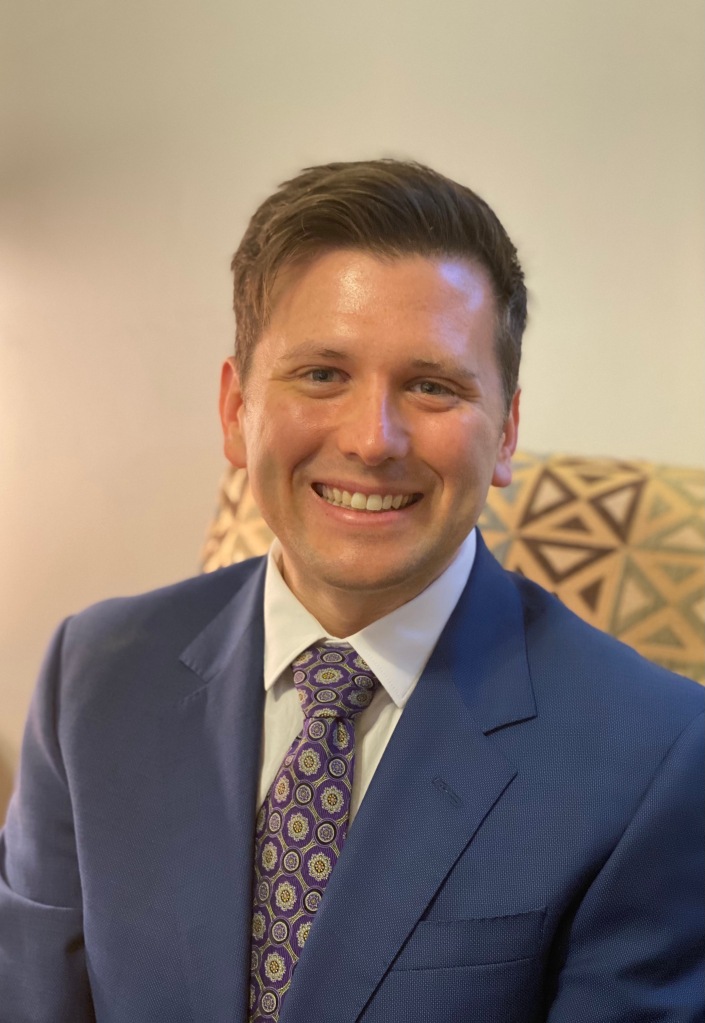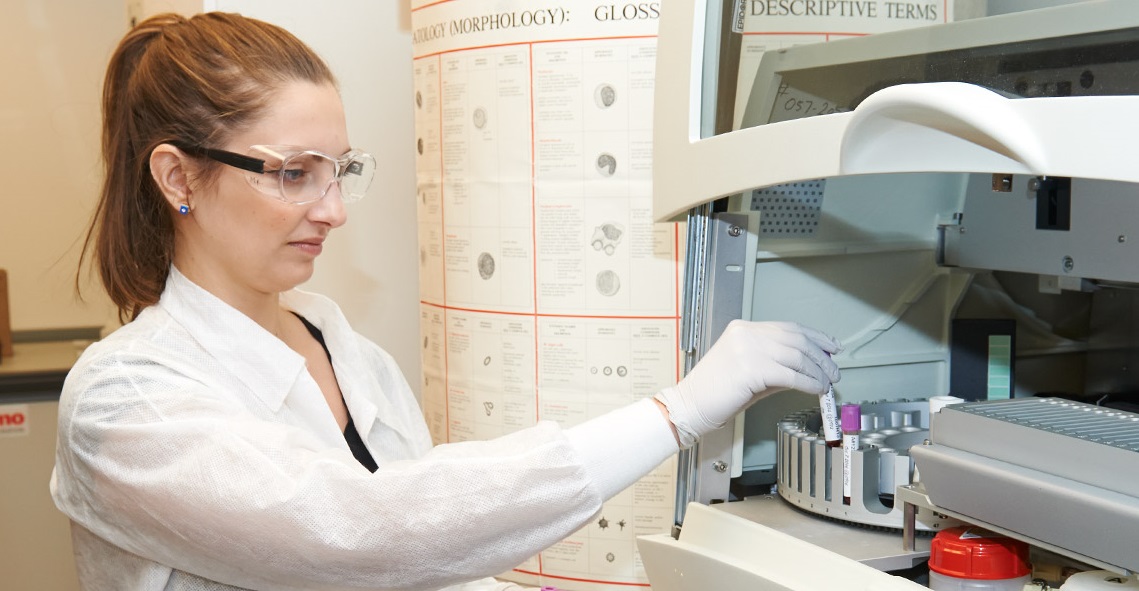My name is Sarah Brotherton MLS(ASCP)CM and I am a generalist travel Medical Laboratory Scientist currently working at a 10-bed critical access hospital above the Arctic Circle in Alaska. I graduated from the University of Alaska in 2012 and from Weber State University with a degree in Medical Laboratory Science in 2014. I have been working in clinical laboratories since 2013.
Nour AlMozain – Hematopathology, Transfusion Medicine & Apheresis Consultant
My name is Nour AlMozain and I serve as a hematopathology, transfusion medicine, and apheresis consultant in the Laboratory and Blood Bank departments at King Saud University Medical City (KSUMC) in Riyadh, Saudi Arabia. It is one of the largest academic hospitals in Saudi Arabia and the Middle East. I supervise a large donor center that collects around 70-100 whole blood and apheresis platelets per day. I oversee the blood component manufacturing process, ensuring that blood products meet the quality of national and international standards. I also lead the inventory management process, always ensuring that blood requisitions meet patient blood management recommendations and local hospital policy guidelines. In addition, I review and report transfusion reactions and help the blood bank scientists in dealing with pre-transfusion testing. Our department provides a wide range of therapeutic apheresis procedures performed by our apheresis nurses, including: therapeutic plasma exchange, red cell exchange, and stem cell collection. My role is to provide consultations for these patients and help the primary teams tailor the appropriate management plan.
Continue readingAlex Shepard – Cellular Therapies Laboratory Specialist
My name is Alex Shepard and I am a Cellular Therapies Laboratory Specialist. I currently work in the Cellular Therapies Laboratory at Children’s Healthcare of Atlanta, Egleston Campus in Atlanta, Georgia, United States. The laboratory supports the bone marrow transplant (BMT) program at Children’s by processing and infusing products obtaining hematopoietic progression cells, or stem cells. The BMT program at Children’s, who performed approximately 100 transplants last year, is one of the largest pediatric transplant programs in the country. In addition to performing autologous and allogenic pediatric transplants for hematologic disorders, Children’s also offers transplantation for immune dysregulation and immunodeficiencies such as severe combined immunodeficiency and hemophagocytic lymphohistiocytosis, transplants to cure sickle cell disease by allogeneic transplant or autologous transplant with gene therapy, and CAR-T cell therapy.1

Dr. Jo Horne – Consultant Healthcare Scientist
My name is Dr. Jo Horne and I am a Consultant Healthcare Scientist working within a large Cellular Pathology department at University Hospital Southampton NHS Foundation Trust (UHS). UHS is a large UK teaching hospital in Southampton, which is a city on the central south coast of England. I work within Cellular Pathology, which is part of a large department with approximately 150 staff working in various general and specialist sections, as well as over four separate floors of the hospital. UHS is a regional referral centre and so we deal with the most complex patient samples within the south central region of England.
Why I Chose the Medical Laboratory Profession
I am always thankful to be working as a medical laboratory technologist, a career I am very passionate about. I remember my journey towards discovering my ideal career, and let me tell you, it was not an easy one. I was in a similar situation as many other students in high school, not fully aware of the range of career options available. I completely understand how many high school students can feel stuck, undecided, and anxious on their career choices prior to entering further studies. This can result in students choosing an educational path without making an informed decision of all the career options available to them. As a result, there are many new graduates who have trouble finding a job within their field and pursue additional programs in order to acquire more qualifications. I believe a thorough search of the vast number of career options available will help students make an informed decision.

Clinical Perspectives: Rh Immunoglobulin and Hemolytic Disease of the Fetus and Newborn
In these modern times, it can sometimes be difficult to recognize the significant impact that many medications have had in eliminating fatal conditions and diseases. For any woman who has been pregnant and has the Rh-Negative blood group, this medication is Rh Immune Globulin (or RhIg for short).

WinRho, the Rh Immunoglobulin medication used at my hospital
Vahid Anwari: X-Ray Technologist
**Vahid Anwari, an X-Ray Technologist working in a large acute care hospital in downtown Toronto discusses his role in the healthcare team, as well as the exciting research opportunity in which he leads.**
Clinical Perspectives: Electrocardiogram in the diagnosis of heart conditions
Whenever a patient presents with chest pain, shortness of breath, dizziness, fainting, or irregular heartbeats, an electrocardiogram (ECG) will be ordered to determine any heart abnormalities. Many of these abnormalities may include coronary artery disease, unstable angina, acute myocardial infarction, arrhythmias, and cardiomyopathies, to name a few. Coronary artery disease is the build up of plaque in the arteries surrounding the heart, restricting blood flow and resulting in chest pain, which is also known as unstable angina. A myocardial infarction (heart attack) occurs whenever this plaque builds up so much that it completely blocks the vessels, causing the heart to lose blood supply and killing heart tissue. Some symptoms can include: chest pain, shortness of breath, dizziness, nausea, vomiting, and heartburn. Arrhythmias are abnormally fast, slow, or irregular heart beats. Cardiomyopathies are conditions affecting heart tissue, causing the tissue to be dilated, hypertrophic, or restrictive. Symptoms of cardiomyopathies include: shortness of breath, fatigue, swelling of lower extremities, coughing when lying down, dizziness, chest pain, and arrhythmias. Continue reading
Clinical Perspectives: Multiple Myeloma and Serum Protein Electrophoresis
As a physician, a patient comes to you presenting with bone pain, weight loss, nausea, and vomiting. Ordered tests come back abnormal: the complete blood count (CBC) shows low cell counts with abnormal cells, calcium, urea, and creatinine levels are elevated, and the X-ray demonstrates bone lesions. All these signs point towards multiple myeloma, a type of cancer in which plasma cells form multiple masses in the bone marrow. Therefore, a serum protein electrophoresis is ordered to confirm your suspicion. Continue reading
Life Under the Microscope: Toxoplasma gondii
Toxoplasma gondii is the causative agent of the disease known as toxoplasmosis. The parasite was first discovered by Charles Nicolle and Louis Manceaux in 1908. They initially named the parasite Leishmania gondii thinking that it belonged to the Leishmania genus. However, once they realized they discovered a new organism, they named it Toxoplasma gondii, from the Greek toxo, meaning arc or bow, and plasma, meaning something that is shaped or molded. The parasite’s definitive host is the cat in which T. gondii can sexually reproduce.

Toxoplasma gondii




You must be logged in to post a comment.